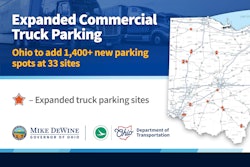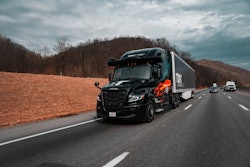Convoy, the one-time freight tech titan that grew to a $3.8 billion valuation before its sudden implosion left dozens of carriers unpaid, has been acquired by DAT Freight & Analytics as part of the load board's bid to become the "safest" freight market around.
Convoy, originally a digital freight broker, abruptly closed its doors in October of 2023 without so much as a final instruction for carriers caught under a load, or severance pay for its own employees. The freight forwarder Flexport, months later, acquired the tech assets of Convoy for about $12 million, according to a source familiar with the transaction.
After just a year and a half at Flexport, Convoy has now been sold to DAT for $250 million, according to Axios. Convoy, in its current form, no longer has broker authority and is now described as the Convoy Platform.
What will DAT's Convoy look like for carriers?
 Screenshots from the Convoy Platform show the carrier user experience. Driegert said "Convoy since day one has been super carrier-centric, trying to ensure the best possible experience." Note the shipper/receiver facility rating tool. DAT
Screenshots from the Convoy Platform show the carrier user experience. Driegert said "Convoy since day one has been super carrier-centric, trying to ensure the best possible experience." Note the shipper/receiver facility rating tool. DAT
“The acquisition of Convoy demonstrates DAT’s ongoing commitment to enhancing network value for our customers,” said DAT President and CEO Jeff Clementz in a release.

Clementz told Overdrive carriers that use DAT won't see any changes to their experience of DAT itself immediately. But Bill Driegert, the former Flexport Head of Trucking who moved as part of the acquisition to become DAT's EVP of the Convoy Platform, said the Convoy Platform will change.
"What will change is carriers will see more loads" within the Convoy app, said Driegert. "There's a significant amount inbound on the broker side" and a "massive influx of interest" shown in the platform by brokers.
In theory, the partnership will provide Convoy with greater visibility and volume as DAT reaches out to select carriers on specific lanes that might benefit from using the Convoy Platform. On the broker side, DAT will offer Convoy's automated freight transactions and carrier-vetting steps.
Clementz said Convoy's onboarding process should be "pretty lightweight" for carriers, and Driegert said Convoy does not ask for ELD integrations. He's aware other "carrier vetting" platforms get flack for that ask. Instead, Convoy tracks loads through the application itself.
Driegert said he'd love carrier input on the vetting system, and that "our objective is that if you're a good, honest business owner, which almost all small carriers are, then this will be a good path to get freight." Convoy's carrier onboarding wouldn't flag carriers for lack of inspections and instead would rely on a "secret sauce" approach heavy on "very advanced forensics" and certificate-of-insurance (COI) monitoring to flag bad actors.
Clementz hoped that asking carriers to onboard "once instead of every time" they transact with a new broker could clear up "a lot of the headache" carriers feel on load boards. Clementz said DAT has a relationship with 8,000 brokers and sees about one million loads posted a day.
In the next year or two, he added, expect the Convoy and DAT apps to become one, where carriers will log on and see freight posted by brokers using Convoy just like any other load. The carrier might end up negotiating against Convoy's automated process, but Driegert said that the outcomes of the AI-powered negotiation fall within a preselected price range from brokers, and don't really vary that much from negotiating with a real human.
“The acquisition of Convoy demonstrates DAT’s ongoing commitment to enhancing network value for our customers,” Clementz said. “Together, we will give customers a better, broader freight-matching network, the ability to manage more loads and capture incrementally more business, and ultimately more choice.”
Most of the changes up-front from the Convoy acquisition will be broker-facing, he added, sharing how Convoy's integration with DAT will make the network "safer" for carriers.
"The Convoy Platform requires every broker to go through a rigorous onboarding process before they can post a load," he said. "That means carriers are only booking with verified, active companies, not unknowns."
Clementz said that booking directly through the app "cuts out the risks that can come with phone calls or emails," and that in the system "carrier information is only shared with the parties involved in the transaction, never exposed publicly where it could be scraped or misused."
Carriers in Convoy platform "can be confident that the price is the price, accessorials are standardized, and payment is simplified," he added. "They also can be ensured that our team has worked closely with brokers to ensure that all information transferred is accurate, to eliminate surprises."
[Related: Proactive fraud defense Convoy employed before its 2023 collapse]
Why did Convoy go from worth just $12 million to a reported $250 million?
"Brokers are our core customer base to drive this," Clementz said. DAT is the largest load board, but its broker customers have made it clear that they want DAT to be the "largest, safest and most efficient" load board.
Clementz said the Convoy acquisition moved the needle on safety and efficiency, which he's focused on during his first six months as CEO.
Flexport Founder and CEO Ryan Petersen noted his company's investment in the Convoy Platform was driven by seeing its potential. In 18 months since the purchase, "we improved the core technology platform, reengaged the market, and significantly increased its value. Importantly, we demonstrated a strong product-market fit by decoupling the platform from a brokerage.”
Driegert said Flexport put in "a ton of work" over those 18 months bringing carriers and brokers back in after the collapse, "reconfiguring this as a whole new product and a whole new business" during a "very intense" period. Driegert acknowledged that Convoy did have some "equity" in the brand already, and "also the perception that comes with it."
Despite multiple lawsuits with dozens of carriers claiming non-payment from Convoy, Flexport's work seems to have paid off.
"We felt it was really essential to get this capability," said DAT's Clementz of the recent acquisition, re-emphasizing the strategic move toward safety and efficiency: "The valuation is based upon how important is this to our business."
What happened to Convoy's unpaid carriers?
Not only did Convoy leave dozens of carriers unpaid collectively around $3 million, but Convoy and DAT battled in court as recently as two years ago, reaching an "amicable settlement" in a row over trade secrets.
Both Clementz and Driegert saw that as water under the bridge. "That was a different business and a different time," he said. In Convoy's case, that was two owners ago, and for DAT, something that happened under previous leadership.
As for the carriers left unpaid by Convoy, one of two major interpleader lawsuits trying to determine who to pay after the 2023 collapse has settled. Ikea's $500,000 interpleader case with Convoy's carriers concluded with the lion's share of the money going to Hercules Capital, the venture capital firm that shut Convoy down and sold its technology.
Previously, Flexport directed carriers stiffed by Convoy to reach out to Hercules Capital for payment.
The second big lawsuit -- between Convoy's old bonding company and 429 named carriers and factoring companies claiming a total of $2.6 million -- remains in process for now.
Driegert said he wasn't aware of any carriers who hadn't been paid by Hercules, but there are hundreds of carriers listed in that second lawsuit, and an owner-operator not named in that case but owed more than $30,000 by Convoy confirmed he had not yet been paid.
A debt collector who had worked on some accounts owed money after Convoy's collapse said the few accounts they knew settled for "peanuts," or less than 30% of the total invoice when the norm in these collections situations sits around 50%.
"Nobody likes how it went down at the end," said Driegert. "It was a different business then," he said.
Today, leadership at DAT and Convoy both hope their technology makes things easier and more efficient for carriers. Indeed many of the same carriers once stiffed by Convoy even moved back onto the app, impressed by its ease of operation.
[Related: Convoy back in court: Hundreds of carriers seek $2.6M from unpaid loads]










